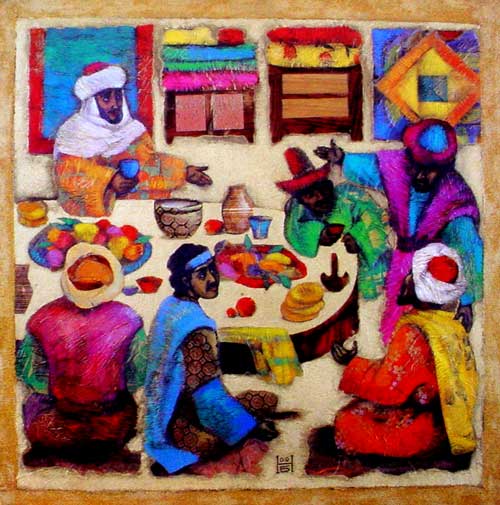


"The Lowest Places at the Feast" by Kazakhstan Artist Nelly Bube.



Verses 1-24 occurred on one occasion, mentioned in verse 1. Morris calls this section "Dinner with a Pharisee." Note that the word "invite" in one form or another binds the whole of this section together: 8, 9, 10, 12, 13, 16, 17, 24.
Where does this take place? Some suggest that Jesus is still in Perea. Jesus is invited to dinner at the house of a prominent Pharisee. Commentators agree that this was a meal after the synagogue service. Some suggest that this took place in Jerusalem, but that is unlikely. There were Pharisees in Perea too. Note that the disciples are not mentioned. This lends weight to the Perea locale.
It was not uncommon for Jews to have a feast on the Sabbath after the synagogue service so long as the food was prepared on the previous day.
All the guests were Pharisees. They all watched Jesus carefully. The context indicates that there was less hostility from the Pharisees than on other occasions but this by no means says that they were friendly.
Fahling: Jesus accepted the invitation, although He was aware of a rather strange situation: invited as a friend by a great man among the Pharisees, as if to be held in honor, and yet regarded with suspicion and carefully watched. . . . No doubt it was a trap set for Him. . . . At any rate, it was a case where heartless and unfeeling teachers would cruelly make an object of mercy and his suffering a tool in their hands. . . . They could not answer the question in the negative. They knew what the answer of Jesus would be. They felt that it was not only lawful, but right; and still, to have made the admission would have amounted to disloyalty to the whole system for which they stood. And so there was an awkward silence. . . The plot had failed.
Jesus does not argue with them. He gets at their heartless, impenitent attitude in verses 7-14.
Luke 14:2 There in front of him was a man suffering from dropsy. Luke 14:3 Jesus asked the Pharisees and experts in the law, "Is it lawful to heal on the Sabbath or not?" Luke 14:4 But they remained silent. So taking hold of the man, he healed him and sent him away. Luke 14:5 Then he asked them, "If one of you has a son or an ox that falls into a well on the Sabbath day, will you not immediately pull him out?" Luke 14:6 And they had nothing to say.
A subparagraph, but continuation of the previous, begins here. "He went on to say." This is an illustration, whose point is clearly stated in verse 11.
"The guests" were all the Pharisees. They were choosing for themselves the prominent places.
In verses 8-10 Jesus gives a very simple illustration, applying it directly to the situation that pertained then, but it is far more than social etiquette. Quite evidently the guests at this dinner had scrambled for the prominent places at the meal. The Pharisees were Pharisees even among Pharisees, like the Pharisee in Luke 18 who said: "God I thank You that I am not as the rest of men," meaning other Pharisees too.
A wedding was an occasion when both high and low are invited. On such occasions those who think highly of themselves want to make it known to others.
Notice "the inviter," "the invited," and "invite."
"You will begin" because the situation is quite different from what the guest had thought. You will look foolish, embarrassed, be ashamed, feel disgrace. All this denotes the very opposite of what the guest thought of himself.
"But" means "quite to the contrary." Compare the injunction of verses 8-9 and that of 10. The form is the same, but it is the very opposite.
This is the point. It is explanatory "you see." The two passive verbs have God as the agent.
Marshall: The saying is identical with 18:14; notice that Matthew 23:12 and the somewhat similar Matthew 18:4. For more on this thought look at Matthew 11:23; 2 Corinthians 11:7; James 4:10; 1 Peter 5:6; Luke 16:15; Romans 12:16; 2 Timothy 6:17.
Arndt: One of the great laws of the kingdom.
Ylvisaker: Even in their own company it was impossible for the Pharisees to conceal their pharisaic tendencies. . . .a person shall do nothing 'through strife or vainglory, but in lowliness of mind let each esteem other better than themselves' (Philippians 2:3) and in the presence of God ever choose the lowliest position. . . . It is the state of mind which is all important, not the outward act. The external form is significant only as the expression of the heart.
How true! Sinful human nature is constantly prone to break the first commandment. Read Philippians 2:1-11. If the sinless Son of God humbled Himself so deeply, how much more must not we sinful, proud human beings do so! Pride amounts to fear that we won't be recognized for our supposed greatness. True humility has no fear. It trusts that God will provide, in His mercy, whatever is necessary.
Verses 7-11 were addressed to the scrambling guests. Verses 12-14 are addressed to the host, obviously the same man mentioned in verse 1. Their unregenerate condition was made clear by their self-esteem. His unregenerate condition is made clear by his lack of true love.
Perhaps the host thought to himself: "Serves them right. They're getting what they deserve." But now Jesus addresses him too, though he had not scrambled as did the rest.
Note the corresponding four items in the prohibition in verse 12 and the four items in the command in verse 13. Those in 12 are definite, those in 13 stress the quality of their destitution.
A deed done with the expectation of return is not love. Look at Luke 6:32-34. That kind of deed can be done by anyone and is a mark of the unregenerate. Of course, Jesus is not saying that it is wrong to have a dinner for those who are close to us. He is talking about an attitude. Why do you invite?
Nor is He saying that we can invite only the destitute. He is talking about an attitude of heart which makes itself evident in deeds. The same principle holds true for verses 8-10. People's attitudes become evident in their deeds.
"Blessed" in the New Testament, when used of persons, always refers to the condition of the repentant, fruitful believer in Christ Jesus. Look at Matthew 5:3-11; Luke 1:45; Luke 6:20-23.
Some translate: "because they haven't the means to repay you." Others: "They cannot repay you." Is Jesus merely saying that they haven't the means or is He saying that humans cannot repay a deed done in the divine and true sense? The final clause, introduced with an explanatory "for" in the Greek, indicates that, in the final analysis, human beings cannot truly repay a selfless deed. God alone can do that. Of course, the deed does not merit eternal life. That thought would be contrary to all of Scripture.
Ylvisaker: Many generous deeds may pass unnoticed or may be even despised on this earth, while acts that have their origin in selfishness and egotism are lauded as the greatest achievements, but time alone will reveal that the requital did not fail. He who gave the strength to accomplish such acts of mercy shall see to it that they are not forgotten on the day of reckoning.
Look at Revelation 14:13. This verse tells us who those are whose deeds will follow them. True good works cannot be rewarded by men after one dies. But these works will be rewarded "at the resurrection of the just," those justified by faith.
Lenski: Thus we see that the love and good works which Jesus here asks are the fruits of faith and are produced by the righteous alone.
The believer produces such works without even being aware of it. Look at Matthew 24:44-45.
To sum up: In our text Jesus is condemning self-righteousness and selfishness. Both are works of the flesh. With two illustrations Jesus deftly preached what we call the second use of the Law, laying the sin of His hearers bare for all to see. He did it because He loved them.